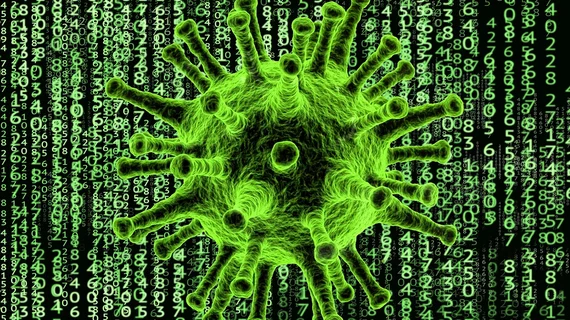Cancer-inspired radiotherapeutic approach has potential as COVID-19 treatment
Oncology experts believe a radiolabeled molecular therapeutic agent inspired by current cancer treatments may also be effective against the coronavirus.
Clinicians from Memorial Sloan Kettering Cancer Center in New York made that assertion in a July 17 piece published in the Journal of Nuclear Medicine. After an investigational lab procedure, the researchers found that a molecular probe targeting a human antibody—known as CR3022—could potentially be used for evaluating patients with COVID-19, or in conjunction with radiotherapy approaches.
Nagavarakishore Pillarsetty, PhD, with Sloan Kettering’s Department of Radiology, and colleagues called their findings a “potent” first step forward in using oncology-based treatments to address the virus.
“Intuitively, a radiolabeled CR3022 could be valuable for imaging, potentially serving as a direct, spatially resolved, contemporaneous and non-invasive readout of viral load within a patient,” the authors wrote Friday. “From a drug-development perspective, a direct readout of SARS-CoV-2 viral load could represent a quick, upstream indicator of therapy success,” they added.
The group labeled CR3022 with Iodine-131—an isotope used as a standard-of-care for some thyroid cancers and during whole-body SPECT imaging—to ultimately create [1-31I]I-CR3022. They used a magnetic bead assay and SARS-CoV-2 spike protein fragment to test whether the new material attached to the CR3022 human antibody.
As a proof-of-concept test, the method proved to be effective, confirming the potential of a labeled version of CR3022 to be used alongside Auger radiotherapy or noninvasive imaging, according to the researchers.
What’s more, they noted that the translational hurdles for a drug would be lower than traditional therapeutics or vaccines.
The findings are preliminary, Pillarsetty et al. wrote. And while they are optimistic, their approach is not an absolute cure for COVID-19.
“While it is unlikely that treatment of SARS-CoV-2, mediated by a radiotherapeutic Auger emitter, can lead to elimination of all virions, radiotherapy could be used in combination with other treatments and consequently improve outcomes,” the team concluded.
Read the entire study in the Journal of Nuclear Medicine here.

